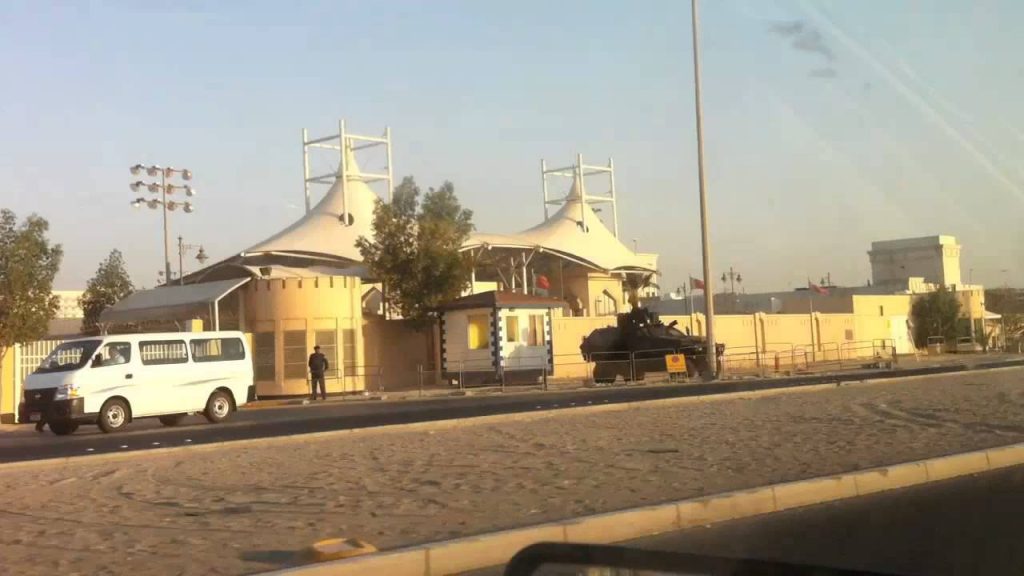9 June 2016 – The Bahrain Center for Human Rights (BCHR), together with Americans for Democracy & Human Rights in Bahrain (ADHRB), the Bahrain Institute for Rights & Democracy (BIRD), and the European Centre for Democracy & Human Rights (ECDHR), are deeply concerned over the alarming situation unfolding at the Dry Dock Detention Center, following the Ministry of Interior (MOI) claims of the escape of 17 detainees last Friday, 3 June.
As disclosed by the MOI, 17 men held in custody in the Dry Dock Detention Center escaped the facility in the night of Friday, 3 June. Security forces immediately launched a manhunt, deploying dozens of security service vehicles and personnel on main roads and setting up checkpoints to search for the detainees. The Minister warned those with any information to get in contact with the authorities, and firmly discouraged anyone from giving the detainees shelter. In addition, the MOI ordered the formation of an ad hoc committee to investigate the case and take legal action against those responsible.
Later that day, an MOI spokesperson reported: “Thus far, eleven of the detainees have been caught along with five others who assisted in the planning and execution of the escape. The search continues for the remaining six escapees”. The authorities have not disclosed any details regarding the nature of the escapees’ detention, or the charges they are being held on. Since the beginning of the pro-democracy movement in February 2011, the prison population in Bahrain has swelled with political prisoners, growing exponentially into the highest incarceration rate in the Middle East. This is due to the criminalisation of acts of assembly, association and expression.
BCHR has received alarming reports from families of detainees in Dry Dock, specifically those held in buildings 16 and 17 used for the long-term detention of minors, alleging their exposure to abuse in retaliation for Friday’s escape. Inmates have been subjected to various forms of ill-treatment amounting to torture. In the past week, prison authorities have forced detainees to break their ongoing hunger strike, to stand for long hours, and to remain blindfolded. Security forces physically beat, kicked and slapped the detainees. They told the detainees that they deserved the punishment, as they knew about and did not report the escape. Several inmates have suffered injuries due to torture. Specifically, one detainee told his family that security forces pulled him by his neck and hit his head on the wall. Four days ago, inmates in building 16 and 17 went on a hunger strike protesting the ill-treatment and torture, many have reported to pass out due to the strike.
Some families have told BCHR that they reported the abuses in the Dry Dock Detention Center to the MOI’s Ombudsman. However, the Ombudsman has not formally responded to these allegations. Instead, the Ombudsman has told some of the families that it cannot do anything as its communication with the MOI is difficult in such cases.
Widespread and indiscriminate punishment continues to be a common practice in the Bahraini detention system. Last year, BCHR, BIRD, and ADHRB documented police response to a riot which broke out in Jau Prison on 10 March 2015. During that event, prisoners protested against the increasingly overcrowded and unsanitary living conditions in the prison. Although only a minority of the inmates participated in the riot, Bahraini authorities punished inmates collectively and with excessive force. They fired tear gas into enclosed spaces and subjected inmates to torture and ill-treatment. Upon regaining control of the prison, the prison forces continued to physically and mentally torture the inmates. They insulted the prisoners, forced prisoners to perform humiliating acts, deprived them of food and sleep, and placed them in solitary confinement. Despite the authorities claiming to have launched an investigation into the incident, no formal action has been taken to hold any officers responsible for committing abuses. Instead, the government sentenced 57 inmates to lengthy imprisonment terms.
In 2014, BCHR and the Bahrain Youth Society for Human Rights found , the reported conditions of detention in Dry Dock to be extremely poor: overcrowding, unsanitary facilities, and mistreatment of inmates are commonplace. Prison guards are free to act without fear of persecution, openly violating the UN Standard Minimum Rules for the Treatment of Prisoners. Under those guidelines,“prisoners shall be allowed under necessary supervision to communicate with their families”, “corporal punishment, punishment by placing in a dark cell, and all cruel, inhuman or degrading punishments shall be completely prohibited”, and “the different categories of prisoners shall be kept in separate institutions or parts of institutions taking account of their sex, age, criminal record, the legal reason for their detention and the necessities of their treatment.”
We therefore call on the government of Bahrain to:
- Immediately and unconditionally end the unjustified mass retaliation against prisoners in Dry Dock detention center;
- End the systematic practice of abuse and ill-treatment of political prisoners in Bahrain, and hold security guards accountable for their misdeeds;
- Uphold international legislation forbidding any form of torture and cruel, inhumane or other ill-treatment or punishment.
Bahrain Center for Human Rights (BCHR)
Americans for Democracy & Human Rights in Bahrain (ADHRB)
Bahrain Institute for Rights and Democracy (BIRD)
European Centre for Democracy and Human Rights (ECDHR)

